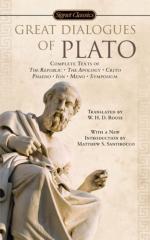
|
| Name: _________________________ | Period: ___________________ |
This quiz consists of 5 multiple choice and 5 short answer questions through Symposium.
Multiple Choice Questions
1. What definition of virtue do Meno and Socrates borrow from "the poets"?
(a) Virtue, like other abstract notions, resists our best attempts to define it.
(b) Virtue is the desire and power to obtain good things.
(c) Virtue is different for every person.
(d) Virtue is the unmoved mover of all things.
2. How does Socrates rebut the definition of virtue offered by the poets?
(a) By giving Meno a solid definition of virtue.
(b) By proving to Meno that there are many commonly held virtues.
(c) By showing Meno that all men desire good things, but that not all men are virtuous.
(d) By instructing Meno that it is impossible to have an abstract entity which moves other things but does not move itself.
3. Who is Eryximachus?
(a) The last speaker and surprise guest at the symposium.
(b) A poet who argues that men and woman were once fused beings.
(c) A philosopher who attacks Pausanias' postion.
(d) A doctor who argues that love is like a medicine curing life's ailments.
4. Socrates claims that he learned about love from which of the following?
(a) Plato.
(b) Diotima.
(c) Alcibides.
(d) Meno.
5. When pressed by Socrates to explain his skill, Ion asserts which of the following?
(a) When he recites poetry he feels like the poet himself.
(b) Socrates should not be asking him questions.
(c) He is unqualified to comment on the artistic value of the his recitations.
(d) When he recites passage about military exploits he cannot tell if he does so with the candor of a general.
Short Answer Questions
1. When Ion admits to Socrates that he can only recite one poet's work well, Socrates is puzzled by which of the following?
2. To understand Ion's poetically inspired spirit, Socrates employs a metaphor of which of the following?
3. Who is the last person to leave the symposium?
4. According to Socrates' insinuation, artistic knowledge is characterized as which of the following?
5. In Ion, Socrates compares Ion to which of the following?
|
This section contains 423 words (approx. 2 pages at 300 words per page) |

|




